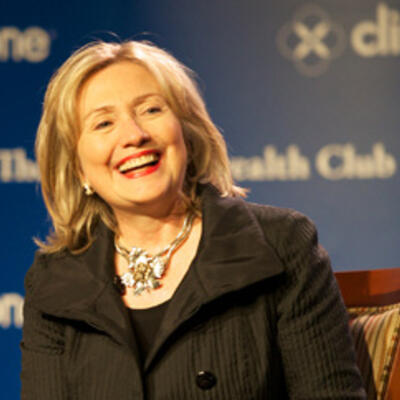Secretary of State Hillary Rodham Clinton

In just her third appearance before a U.S. audience since becoming secretary of state, Hillary Rodham Clinton touted the potential of American innovation to further public diplomacy and to help tackle a host of global challenges. In her prepared remarks and the Q&A, delivered to a sold-out Commonwealth Club crowd of 1,500 at the San Francisco Marriott Marquis, Clinton commented on global flashpoints – Afghanistan, Iran, and Mexico – while also addressing climate change and clean energy.
Clinton repeatedly stressed the need to leverage the creativity of Silicon Valley and America’s other innovation hubs with work underway at her department. “Innovation is one of America's greatest values and products,” she said, “and we are very committed to working with scientists and researchers to look for new ways to develop hardier crops or lifesaving drugs at affordable costs, working with engineers for new sources of clean energy or clean water to both stem climate change and also to improve the standard of living for people.” She cited a new initiative at the U.S. Agency for International Development – Development Innovation Ventures – that “will invest in creative ideas that we think can lead to game-changing innovations in development.” The first round of financing went to solar lighting in rural Uganda, mobile health services in India, and an affordable electric bicycle that doubles as a portable power source.
Later, in the Q&A, Climate One founder Greg Dalton asked Clinton if the State Department would reconsider granting a permit for the Alberta Clipper Pipeline, which would carry crude oil processed from Albertan tar sands fields to the American Midwest. Clinton conceded that while a final decision had not been made, the project was likely to go ahead for several reasons. “We're either going to be dependent on dirty oil from the Gulf or dirty oil from Canada. And until we can get our act together as a country and figure out that clean, renewable energy is in both our economic interests and the interests of our planet.”
Clinton framed the Alberta Clipper decision in the context of the Senate’s failure to act on climate change, and the Obama administration’s own efforts to confront climate change. “I don't think it will come as a surprise to anyone how deeply disappointed the President and I are about our inability to get the kind of legislation through the Senate that the United States was seeking,” she said. “That hasn't stopped what we're doing. We have moved a lot on the regulatory front through the EPA here at home, and we have been working with a number of countries on adaptation and mitigation measures.”
Clinton closed with advice for Ellie, a 10-year-old on hand with her teachers, who expressed concern for the future environment. “I think that there is a lot that you can do, because it's been my experience that young people are much more environmentally conscious and committed to protecting the world you're growing up in than some of us older people are. Working on projects in your school, asking questions like this of people like me who talk about priorities for our country.”
“I'm out of politics, as you all know. The secretary of state is not involved in any political activity, and certainly not elections. So speaking as a private citizen,” she added, to laughter, “I think people running for office should be asked to explain their positions on what they're going to do. I'm hoping that your question, Ellie, will be on the minds of everybody. Because clearly the air we breathe, the water we drink, the food we eat is all connected to our environment. And it's up to us to give it to you in as good a shape as it should be.”
–Justin Gerdes
Climate One, San Francisco Marriott Marquis, San Francisco (October 15, 2010)